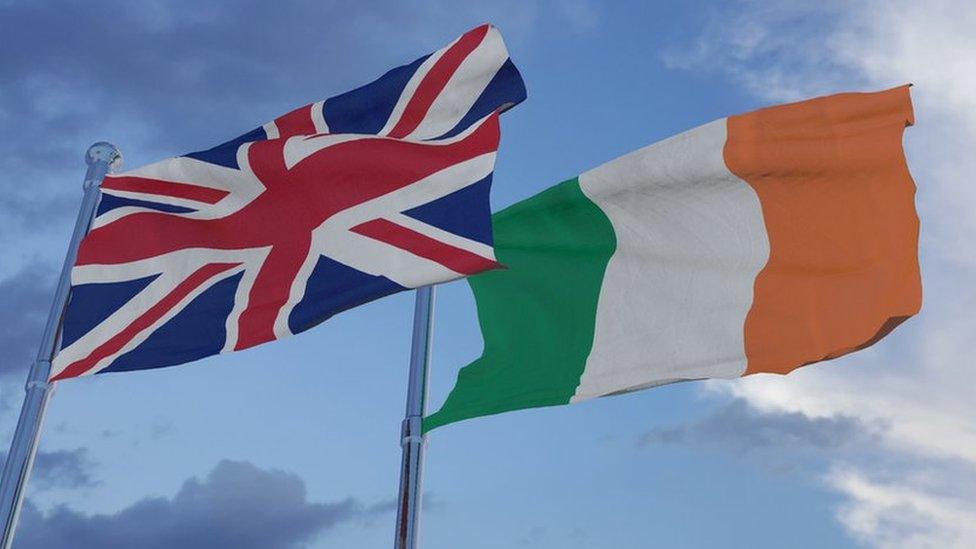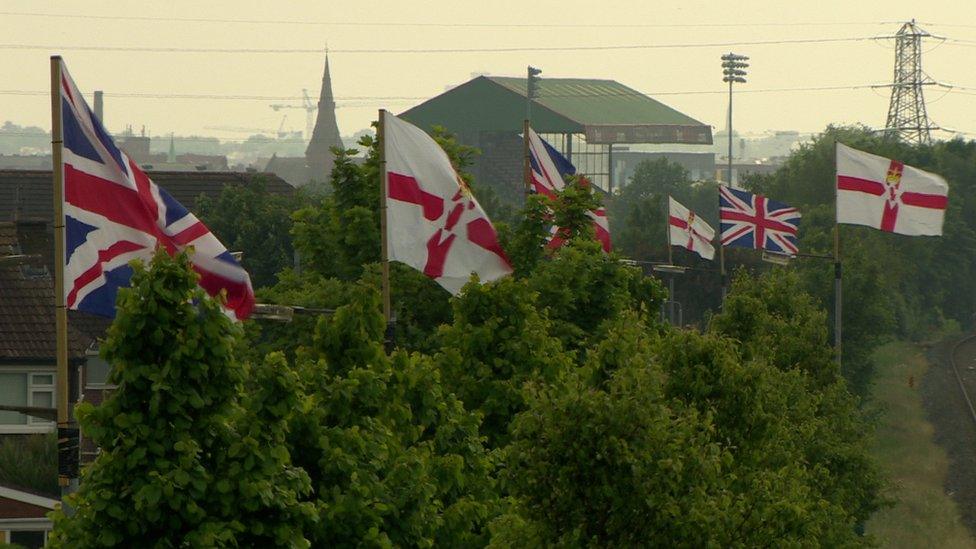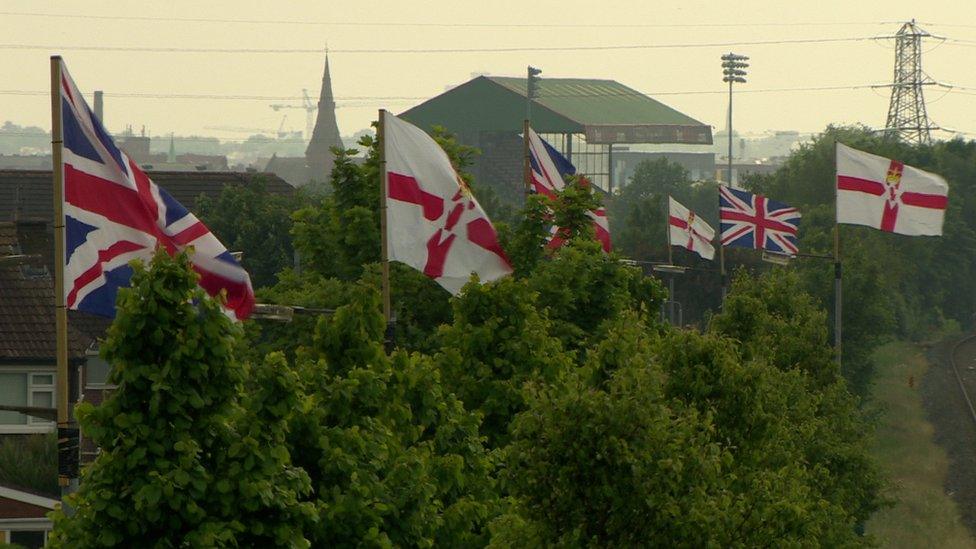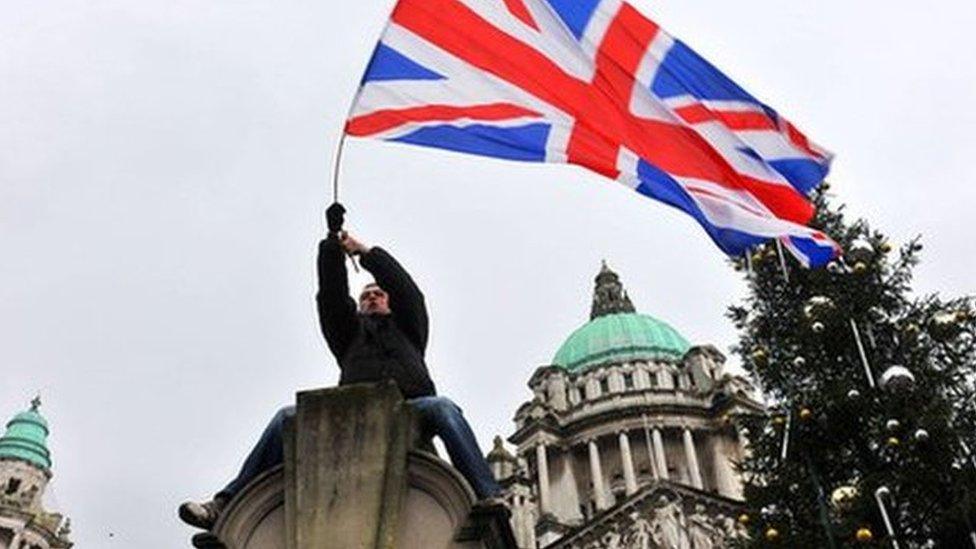Flags report: Stormont publishes £800k report without action plan
- Published

The commission was set up in 2016 to find consensus on flags and difficult cultural issues
A report dealing with flags and culture in Northern Ireland has been published after a delay of nearly two years.
Stormont had set up a commission in 2016 to find consensus on contentious cultural issues.
Despite making some general recommendations, the report states that many specific "challenges remain" around flags, bonfires and memorials.
The report does not contain an action plan, meaning it is unlikely the proposals will be implemented soon.
The paper runs to 168 pages and contains 17 chapters looking at a range of areas including identity, flags, bonfires, murals, memorials in public spaces.
The Commission on Flags, Identity, Culture and Tradition had been due to report in December 2017, 18 months after it was set up.
However, its work was affected by the collapse of devolution in Northern Ireland in January 2017.
Its findings were finally presented to the Stormont executive in July 2020 but have not been made public until now.
'Unable to reach consensus'
On flags, the commission said it had not come to agreement on whether changes should be made to existing legislation on placing flags on lampposts and other street furniture.
Flags report: Stormont publishes £800k report
It also looked at the flying of flags on public buildings and said there had been "no meeting point" reached.
The report says a new "civic flag" was discussed - it would "not be a regional flag or a national flag but rather a civic flag that would be designed to be representative of the diversity of our society, including our new communities".
However, it was unable to reach consensus on the proposal and said it hoped political and civic leaders could progress this issue.
On bonfires, the commission recommended that the Stormont executive should recognise that "bonfires are an important aspect of the culture, identity and tradition of communities and are therefore a legitimate form of celebration or commemoration, provided they are compliant with the law".
It also recommended that where bonfires occur in a legal manner, "as a minimum" the collection or gathering of any materials on a bonfire site should begin no earlier than six weeks prior to the bonfire being lit.
Northern Ireland's first and deputy first ministers said they welcomed the publication of the report and that it was right the public was able to see it.
'Scandalous' delay
A working group led by Junior Ministers Gary Middleton and Declan Kearney, which was established to consider issues in relation to the report, will continue to meet.
Earlier on Wednesday, Justice Minister Naomi Long said it was "absolutely scandalous" that the £800,000 report had taken two years to be published.
She said the report was being "orphaned" with nobody taking responsibility for it.
The minister said the report deals with issues "which affect people's everyday lives - bonfires, flags, paramilitary trappings on buildings".
"All those things that people are constantly concerned about and raise with us regularly and instead of taking political leadership and trying to drive forward a programme of work to address them, this is now being abandoned," Mrs Long said.
"It certainly doesn't seem to be going to be implemented by the Executive Office."
Prof Dominic Bryan, who oversees the commission told BBC News NI that there had been some progress made but "less progress on flags".
"On the flags on public space issue, we haven't got full agreement, but we've certainly moved things on and that's true for a lot of these issues," he said.
"We have got recommendations to start solving some of the difficult issues, around the flag stuff and public buildings.
"People will be disappointed at this - I'm disappointed by this - we've only got options that people are aware of."
He added: "I think we've moved forward in significant ways and I hope when people read it they'll see the positive stuff in what we can do in a diverse society."
'Implement some proposals'
But Mr Kearney, a Sinn Féin MLA, said he believed the report should be accompanied by a plan for implementing the recommendations.
"That is what will be missing and I think that is a mistake," he said.

The commission has been accused of not providing value for money
"I would much rather see scaffolding established in order to ensure an orderly implementation of those proposals within the report that I believe are deliverable.
"There are then clearly challenges which remain, but if we had had a framework of next steps, then we could tackle those.
"It is for the parties who oppose the good sense of an implementation plan to speak and answer for themselves."
Democratic Unionist Party (DUP) MLA Christopher Stalford said it was time for the public to give its views on the report.
"The answer on these matters is mutual respect but it is hard to come by when Sinn Fein campaigns to remove every trace of Britishness from Northern Ireland," he said.
"Such cultural and identity weaponisation will make solutions very difficult to come by as some want cultural domination rather than respect."
'£800,000 ornament'
The Social Democratic and Labour Party (SDLP) has called the decision to publish without an implementation plan "a farce".
SDLP MLA Sinead McLaughlin, who chairs the Stormont committee tasked with scrutinising the work of the first and deputy first ministers, said it underlined the "dysfunction being driven to the heart of government by the DUP/Sinn Féin relationship".
"It is far too important a challenge to allow this document to become an £800,000 ornament at Stormont Castle," she said.
"In the absence of direction or leadership from the first ministers, I will be seeking to invite the co-chairs of the commission to come to our committee and outline their view on implementation of the report recommendations."
Why was the commission set up?
The commission was announced as part of the Fresh Start Agreement, negotiated by the Stormont parties in November 2015.
It was supposed to help the parties reach consensus on contentious issues surrounding flags, emblems and identity in Northern Ireland, and produce recommendations for the executive to take forward.
It began its work in June 2016, after its make-up was announced by the then first and deputy first ministers, external.
Co-chaired by Queen's University academic Dr Dominic Bryan and community relations worker Neville Armstrong, the commission has 15 members.
Seven members were appointed by political parties and eight were drawn from a recruitment process.
Five of those on the panel have links to unionism - it also included a former Alliance Party special adviser, a former SDLP adviser and a former Sinn Féin councillor.
Related topics
- Published22 March 2021

- Published3 June 2018

- Published3 June 2019
